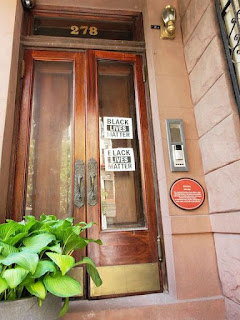In Houdini's day the great struggle was that of women seeking equality in society and especially the right to vote. The "Suffrage" movement sparked demonstrations and even violence. When asked if he approved of "women participating in everyday life" (code for equal rights), Houdini's answer was an unequivocal, "Yes."
But he largely led by example–such as inviting Suffragettes onstage to challenge him in 1908–and avoided the mire of politics, stating: "I hope to keep out of politics, for that is a game in which most of us are defeated before we even get into."
But what about racial equality?
Being Jewish and an immigrant, Houdini certainly understood the sting of institutional discrimination. And while he wasn't perfect (his films and fiction trade on racial stereotypes), he had a strong sense of justice and did express a tolerance uncharacteristic for that time. For instance, he was impressed with the racial equality he witnessed in British Music Halls, and wrote about it in his New York Dramatic Mirror column on November 12, 1904.
In this remarkable paragraph, written in England for American readers, one may infer of his own feelings on race equality. And while Houdini's use of the word "colored" is considered offensive today, it was the most respectful language he could have used at that time.
Just a few lines referring to your article appearing Sept. 24, in which you reproduce a cut of a team called Cline and Clark, in which a white woman is doing a sketch with a colored man. That is nothing unusual on this side of the pond, and were I a colored man I would never leave this country. They are all looked upon here just as amicably as if they were white. The color line is unknown here, and many a team I've seen in which the man is colored and his partner white. The colored race over here has made a great big hit, and certainly are making good with their ability. I have been on the bill with several American colored acts that have "made good" without question. I may mention Brown and Navarro, Grant and Grant, La Belle Morcschania, Johnson and Dean, White and Black, the Four Black Troubadours, Eph Thompson, George Jackson, etc., and all have done well.
I trust that these few lines will not open any controversy, as I simply write for general information and nothing else.
Wishing everyone a safe and united Fourth of July weekend.
Related:



It wasn't all roses. HH wrote a few ugly things in his diary, but it wasn't intended for the public. One of the items he wrote stung me a bit, but it's all in the rear view mirror.
ReplyDeleteTrue. I remember reading that he sometimes used the "N" word in his writings.
DeleteI'm aware of the one use in the diary entry Leo speaks about in Silverman. (I knew someone would bring that up, but surprised how fast!) For what it's worth, Silverman, who read all his diaries and got a good sense of him, writes: "Houdini rarely used such epithets as 'n*****' and 'sheeny'--unlike many others in his time--and then to indicate social class much more than race or ethnicity."
DeleteI have to say John that the diary entry about his old neighborhood on the East Side and the Charmian London affair were the two discoveries that for me made HH more human after all.
DeleteMy greatest wish in the world is to read those diaries in full.
Delete...And then world peace. But diaries first! :p
DeleteWhen Houdini put together the first show he produced, the American Gaiety Girls (1896), two of the performers in the show were African-American. I talk about this on page 42 of Houdini--the Key. I make a mistake of fact on page 42 and corrected it and apologized for it on houdinithekey.com
ReplyDeleteI am ashamed that my namesake had at times used derogatory language about African-Americans. Hopefully, as he aged as we all do, "He matured and realized the the things he said about other races was wrong." However, we should NEVER forget the clear anti-Semitism Houdini faced at his performances and even being put on trial in Germany during his performances there and during his anti-spiritulist exposures right here in the good old USA. Indeed, he and I have faced and confronted anti-Semitism against us but WE NEVER LET IT DEFEAT US IN BRINGING JOY TO ALL RACES IN THIS WONDERFUL ART WE CALL MAGIC!🎩🐰Benjilini
ReplyDeleteI think you can feel good about how your namesake expressed himself in the Dramatic Mirror, which is why I wanted to share it. As for anti-Semites, in Pat's The Key he reproduces a remarkable letter from Houdini to Dr. Waitt in which he says: "I was never ashamed to acknowledge that I was a Jew, and never will be, but it is awful what I hear from people that are Jew haters, and do not know that I am a Sheeney. But the H–– with them (excuse my warm language) it takes all kinds of people to make a world."
Delete